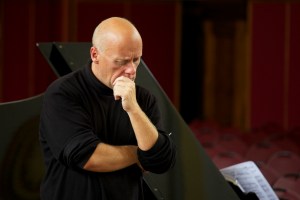
Des canyons aux étoiles
Georgia Ioakimidis-MacDougall
ANAM fellowship concert
South Melbourne Town Hall
26 November, 2014
By Andrew Aronowicz
It’s difficult not to feel an air of ceremony at performances of Messiaen’s music. And I don’t think it’s just due to the overt religious references; it’s because we hardly ever get to hear it live. Messiaen in Melbourne is sadly all too rare a treat, but a treat it was to gather on Sunday evening at the Australian National Academy of Music to hear the 40th anniversary performance of Des canyons aux étoiles…, one of his most sublime orchestral creations.
Written to celebrate the bicentenary of the founding of the United States, the work is at once grand and profoundly intricate in its design. The canyons in question are the majestic gorges and rock formations that define the desert landscapes of Utah. Much of the score’s sparkling edifice suggests these bold, rugged features, constructed from finely wrought orchestral chords, and the angular language of birdsong.
The orchestra for Sunday’s performance was mostly from ANAM’s current cohort, though fleshed out with some friends and local freelancers. The ensemble met the challenges of the work head on, producing a glittering tapestry of sound replete with startling chord changes, dramatic extremes and choruses of sparkling, rustling gestures evoking the birds of Messiaen’s inspiration. At the helm was conductor Fabian Russell, who maintained complete control over the frequently wild score.
Of the 44 individual instrumental parts, four soloists dominate the kaleidoscopic texture of the work, perhaps the most demanding of which is the solo piano. Jacob Abela handled the awe-inspiring complexity of the piano writing with consummate skill and flair, achieving a timbral range befitting the work’s dynamic demands. His performance of Le moqueur polyglotte, a fiendishly challenging catalogue of tricksy Mockingbird calls, was brilliant to behold.
Ben Jacks made a golden sound in his robust performance of the french horn solo. His reading of the Appel interstellaire (Interstellar call) was hauntingly beautiful, and featured a fascinating display of technical wizardry with delicate colour changes and stratospheric exploration of the instruments upper harmonic spectrum (apparently designed to evoke the plaintive cries of wild coyotes). Similarly, Kaylie Melville and Peter Neville each showed expert handling of the intricate rhythms and colours of the solo xylorimba and glockenspiel parts, respectively.
The performance on the whole came off as impressively accomplished, and any ensemble issues were easily forgiven thanks to the dedication and spirit of the players. The work is long (twelve movements and over an hour and a half of the French master’s dazzling colour onslaught), but the sense of cohesion and logic was generally well maintained.
-Andrew Aronowicz
Partial Durations is a Matthew Lorenzon/RealTime joint project.